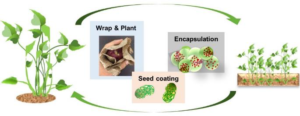 NC State Professor Saad Khan is developing novel material platforms to ensure global food security through sustainable crop protection. These materials (fibers, particles and matrices) are capable of slow and sustained release of pesticides without negatively impacting the seed germination and plant growth process. Dr. Khan reported that they have developed a novel wrap and plant technology for smallholder farmers in Benin and Kenya. Promising results in Kenya and Benin have opened opportunities to expand the trials further to other countries, Tanzania, Togo, Ghana and Nigeria, with support from the Bill and Melinda Gates Foundation. Dr. Khan and his colleagues have expanded the trials in sweet potato fields in North Carolina and the plans to transition this approach to mechanized farming are in the pipeline.
NC State Professor Saad Khan is developing novel material platforms to ensure global food security through sustainable crop protection. These materials (fibers, particles and matrices) are capable of slow and sustained release of pesticides without negatively impacting the seed germination and plant growth process. Dr. Khan reported that they have developed a novel wrap and plant technology for smallholder farmers in Benin and Kenya. Promising results in Kenya and Benin have opened opportunities to expand the trials further to other countries, Tanzania, Togo, Ghana and Nigeria, with support from the Bill and Melinda Gates Foundation. Dr. Khan and his colleagues have expanded the trials in sweet potato fields in North Carolina and the plans to transition this approach to mechanized farming are in the pipeline.
In 2023, Dr. Khan and his team encapsulated plant growth promoting hormones for switch grass in collaboration with a startup InnoSense Corporation. They have also used some active ingredients from collaborators Valent Bioscience and Valent USA to investigate the encapsulation efficiency and release profile for various hydrophilic and hydrophobic active ingredients. These efforts have helped tailor the delivery platforms based on the nature of the different types and sizes of the active ingredients verifying the universality of their delivery platforms. Minimum possible loading of the active ingredients on a solid matrix makes the approach cost-effective, environment friendly and less hazardous for humans and animals.
Several faculty members are involved including Dr. Charles Opperman from Plant Pathology & Entomology department, Dr. Lokendra Pal from Forest Biomaterials, Dr. Daniel Coyne from the International Institute of Tropical Agriculture, Kenya, and Dr. Antoine Affokpon from the School of Plant Sciences, University of Abomey-Calavi, Benin. Dr. Khan also report two invention disclosures, two patent applications filed, eleven publications generated, four graduate students, three undergraduate and one post doc supported. Dr. Khan and his colleagues are also investigating the commercial application of these innovations and post doc Dr. Tahira Pirzada participated in NC State’s ICorps program.
